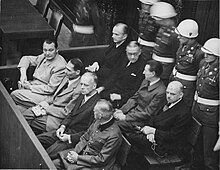International court
[1] Early examples of international courts include the Nuremberg and Tokyo tribunals established in the aftermath of World War II.
Further international courts exist elsewhere, usually with their jurisdiction restricted to a particular country, a global or regional intergovernmental or supranational organisation, or historic issue, such as the International Criminal Tribunal for Rwanda that deals with the genocide in Rwanda.
In addition to international tribunals created to address crimes committed during genocides and civil war, ad hoc courts and tribunals combining international and domestic strategies have also been established on a situational basis.
Examples of these "hybrid tribunals" are the Special Court for Sierra Leone, Special Tribunal for Lebanon, Special Panels of the Dili District Court in East Timor, and the Extraordinary Chambers in the Courts of Cambodia.
Judges and high-level staff of such courts may be afforded diplomatic immunity if their governing authority allows.

